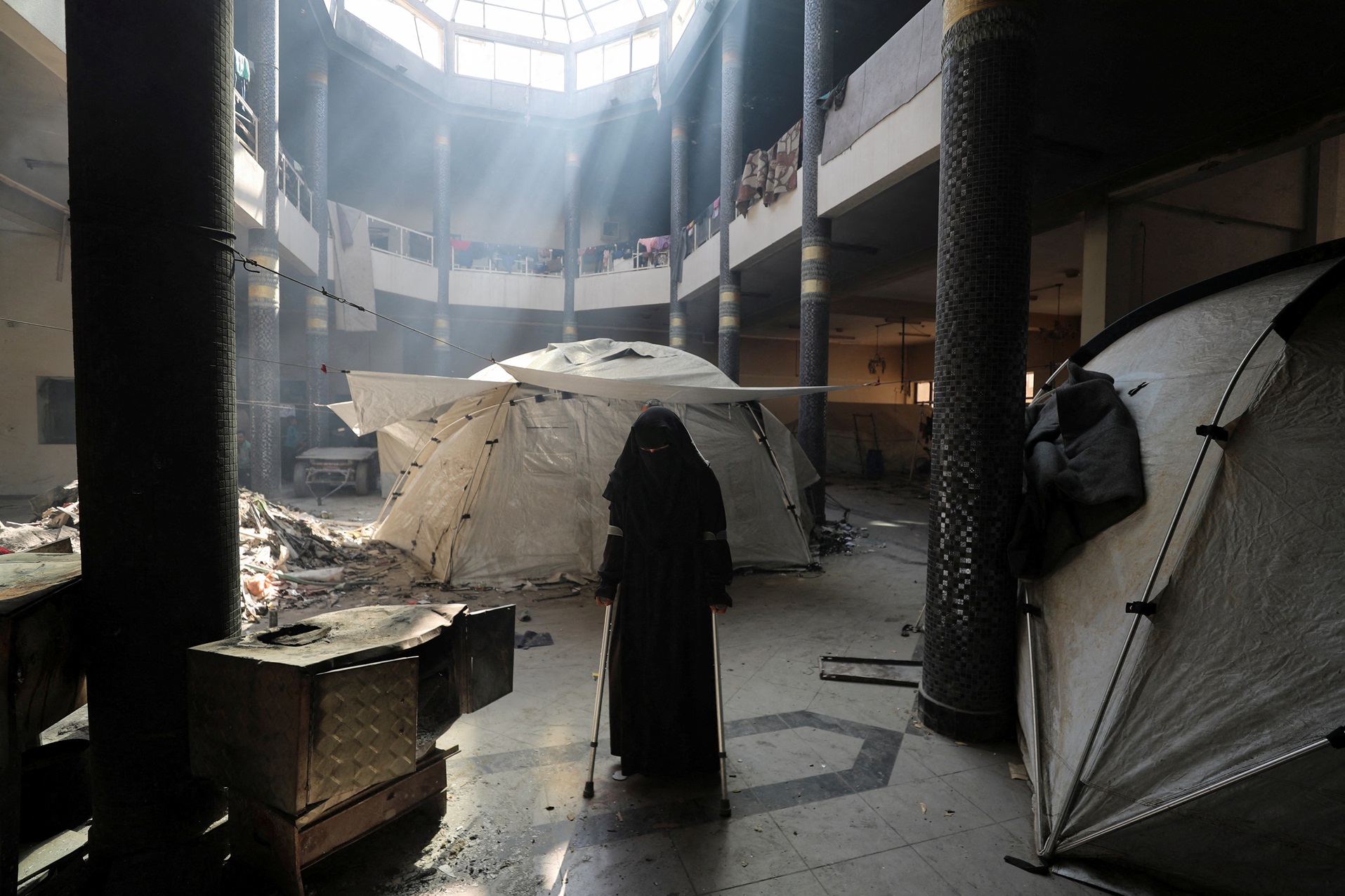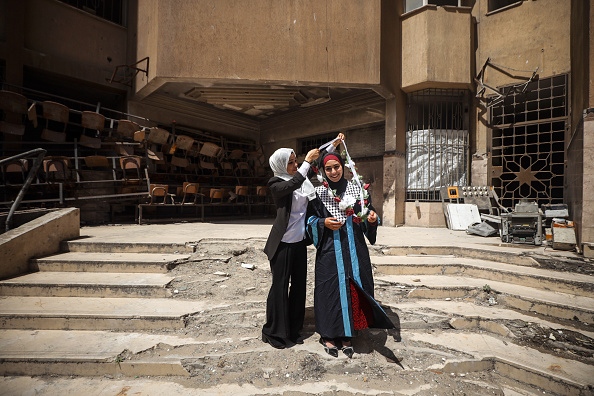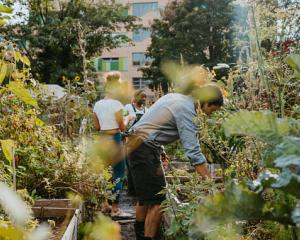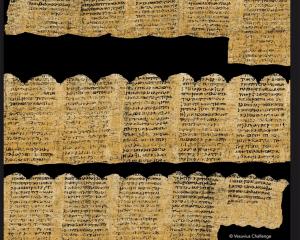
Every day during the war in Gaza Prof Alison Phipps has messaged a colleague in the besieged territory, to record their final words.
Because any moment might be their colleague’s last.
"So, every day they expect to be killed and every day they send me the last words they want to be known by. Because they entrust those in the diaspora, those of us living overseas, to be the ones who might be able to tell their story."
It’s not something Prof Phipps, who has worked for years supporting educational initiatives in the occupied Palestinian territories, ever thought she would have to do.
But the horror in Gaza has forced the Glasgow University professor, who is the Unesco chair for Refugee Integration through Education, Language and Arts — and in 2019 was the De Carle Distinguished Visiting Lecturer at the University of Otago — to take on new roles.
Israel’s genocidal destruction of Gaza, most recently extended to annihilation by starvation and the threat of conquest, has recast the lives of many. In the world of education as elsewhere.
As in too many other ways, the numbers tell a story.
The United Nations’ April update reported the Israeli Defence Forces (IDF) had killed a total of 13,289 students of all ages (up from 12,119 in January) and 651 educational staff (498 in January). More than 21,653 students and 2791 teachers had been injured. Israel had destroyed 57 university buildings in the Gaza strip, up from 51 in January. It had deprived 87,000 tertiary students of formal learning spaces.
Dr Ala Alazzeh, vice-president for community affairs at Birzeit University, in Ramallah, West Bank, recently told University World News he did not believe the destruction of universities was collateral damage.
"We believe they have been deliberately targeted since the beginning of the war. It is not only the act of killing, but also the destruction of the future. It could be called educide or scholasticide," Dr Alazzeh said.
Among the dead are colleagues of Prof Phipps.
One such is Dr Refaat al Ar’eer, an English literature scholar who had been lead investigator in a "Cultures of Sustainable and Inclusive Peace" project. He died early in the war, in December 2023.
"I received the news we all knew was coming: that the hunting of our colleague and friend Refaat al Ar’eer by the Israeli Defence Forces and their lethal, precision targeting, had resulted in his assassination," Phipps wrote later.
Those who have raised their voices in Gaza have been targeted, she says.
Phipps worked alongside Dr al Ar’eer in Gaza, delivering lectures remotely — the long-running Israeli blockade of Gaza meant she hasn’t been able to visit the strip in person since 2013.
But despite everything, Prof Phipps, who was recently back visiting at the University of Otago, has continued to support education there.
In one example it involved examining a Gazan student for their PhD online, in collaboration with the Islamic University of Gaza.
"So, two of us were external examiners, in other countries, and our internal examiner was in the Gaza Strip. And it was an incredibly moving experience. I mean, not only was it a fine piece of work, and the candidate passed with flying colours, but what we had to do to convene the viva," she says.
"I think we all understood it as a form of triumph and resistance that you might pass a PhD during a genocide and a scholasticide."
Nothing about the examination sounds easy. When the professor tried to file her report, platforms crashed, her report disappeared, then, in desperation, she wrote it again and sent it by WhatsApp messenger, so those in Gaza could take screenshots.
The student’s thesis addressed education within the Gaza context, education within the context of a siege and a genocide, Prof Phipps says.
Much of what they had written about has since been destroyed.
"And we began the viva by naming all the people who had been involved in the PhD who had been killed by the Israeli attacks. So we began by naming the vice-chancellor of the university ... one of the vice-deans, one of the supervisors, members of the family. So all of the people were named at the start and it took us half an hour."
Prof Phipps has also helped convene a summit at Glasgow University, for the top UK universities, to look at rebuilding higher education in Gaza.
Among other issues up for discussion was a call from colleagues in Gaza for governments to open their borders, to get leading academics out.
"Because at a time of genocide, the culture is destroyed unless its carriers can be saved," Phipps says. "And so one of the reasons why we’ve always granted asylum to dissidents and to politicians and to elites is because they are the carriers of the culture. And they are the ones who do go back and rebuild the country afterwards."
It was the case with many South Africans who lived outside their country in exile during Apartheid, then returned to rebuild.
The UK government has been lobbied to grant visas through the Council for At-Risk Academics — an organisation founded to help academics escape Nazi Germany and whose first president was Ernest Rutherford.
This year, they have managed to get 15 people visas to study in the UK, Phipps says — a fraction of the number of people from Ukraine afforded the same assistance.
Given the many challenges the people of Gaza face, from the task of staying alive, to finding food, water and shelter, education might seem like a lesser priority.
But education has long been a huge part of life in the occupied territories, Phipps says.
"October 2023, Palestine had some of the best outcomes for higher education in the world."
Education there is the lifeline, the most important thing, she says.
"People are unbelievably serious about it."
Tertiary education is often forgotten in an emergency, she says, yet it is critical to the rebuilding of a country and the survival of the people.

Palestinian education researcher Saleh Albalawi knows these stories first hand, he, and his family, are among the few to have escaped Gaza — among a vanishing few to have made it to New Zealand, where he is now working towards his PhD.
Their long flight began early, when in mid October 2023 the IDF issued an evacuation order to the 1.1 million residents of Gaza City.
The following months saw his family, including his three children, move between UNRWA shelters, living in nightmarish, crowded conditions before managing to cross from Rafah, in southern Gaza, into Egypt. That was only possible because Albalawi’s consulting work in the strip meant he had UN papers. There would have been next to no chance otherwise.
He confirms an assessment shared by Phipps that the first thing that needs to happen in Gaza is a ceasefire, swiftly followed by humanitarian assistance. Little can be materially achieved without it.
"Because each moment in Gaza, we have lost our beloved one ... each minute, we lost a person," he says.
Once a ceasefire is in place, the focus can shift to the destruction wrought by Israel.
And an early priority will be the education system, he says.
"Because since one and a-half years, the students in Gaza didn't officially enrol in the school, which means two school years without enrolment, without learning, which means that we have a big educational loss now due to the current conflict."
It is an issue in which Albalawi is deeply invested. A research project in Gaza on which he worked, investigated the various factors already negatively impacting schools there — including proximity to the border with Israel — so resources might be directed to address them, ensuring equality of access to education for all.
Again, numbers tell the story of the challenge ahead. Gaza had 672 schools, Albalawi says. None are still operating.
It’s a crushing reality given schools are more than just places of learning in the lives of Palestinian communities.
They are centres of community, resilience and resistance, from where Palestinians can look to a future, Albalawi says. Education provides a way to address the huge power imbalance between Israel and Palestine.
"Because we know that there is imbalance of power between Palestine and Israel.
"We look to education as the only tool to have this balance. Because we cannot build, for example, the power to fight, but we can build the human to build the country. So, a school for us means a lot."
In the peace they pray for, the Palestinians of Gaza will rebuild their education infrastructure, but, in the present moment, Albalawi supports the idea of allowing some scholars and students to work and study elsewhere on special visas or scholarships.
"Maybe we ask the government here to facilitate a kind of scholarship for Gaza students who want to continue their studies in New Zealand. And also facilitate the visa for them to come here to continue their studies."
Dr Ritesh Shah, a senior lecturer in Te Pūtahi Mātauranga, the Faculty of Arts and Education at the University of Auckland and co-director of Tāwharau Whakaumu, the Centre for Asia Pacific Refugee Studies, is another with long experience of working in Gaza, supporting education programmes.
It was there he met Albalawi, who contacted him once he was out of Gaza.
Following a "significant amount of advocacy" at the University of Auckland, and with the support of many, Shah secured a funded PhD position for Albalawi at the institution.
"It was not easy at any stage of the process," Shah says. "Our university systems and structures are not really that adaptable to deal with students fleeing humanitarian crises."
New Zealand should be looking to follow Australia’s example, he says, which recently established the Refugee Student Settlement Pathway. It "will encourage university students and staff to play an active role supporting young refugees to pursue their education in Australia". Among its goals is to "provide hope and a future for young refugees and allow them to pursue their educational goals in safety".
The scheme is initially focused on displaced people in the Asia Pacific.
Given the destruction visited on Gaza by the IDF, there need to be pathways out of the territory so the expertise and knowledge held by students and scholars isn’t entirely lost, Shah says.
"It means that we need to be able to open humanitarian corridors and visa pathways for people to get out and continue learning elsewhere."
Elsewhere internationally, US-based network Scholars at Risk (SAR) has been
working with host institutions in Belgium, Canada, Finland, Germany, Italy, Norway, Sweden and the United States to secure placements for Palestinian scholars.
SAR supports calls to protect higher education communities from attack, including by implementing a cessation of hostilities and release of noncombatants, to support scholars and students who are at-risk and protect and promote academic freedom and institutional autonomy, a SAR spokesperson said.
Elsewhere in New Zealand, a University of Otago spokeswoman said the university is investigating how it can support academic colleagues and students displaced through conflict.
"The vice-chancellor will be updating the university’s academic group, Senate, on this work soon and will look to take a proposal forward to the university council in the coming months," the spokeswoman said.
In an emailed statement, Te Herenga Waka Victoria University of Wellington said it maintains a policy of institutional neutrality and does not take positions on behalf of its community.
"This approach, shared by many leading universities, applies regardless of the issue and does not reflect individual views of its staff, leadership, or our wider community."
The University of Canterbury expressed concern about conflicts across the globe impacting students, scholars and universities.
"The right to an accessible education is at the heart of UC’s strategy," a spokesperson said. "The University of Canterbury contributes to this through its full membership of the Scholars at Risk Network whose mission is to protect scholars and promote academic freedom. The university will continue to use that mechanism as a way to support displaced scholars and also has offered scholarships to refugees."
Meanwhile, Prof Phipps is still in daily contact with her colleague, recording those final messages. Because nothing has changed.
"Nothing’s over," she says.












